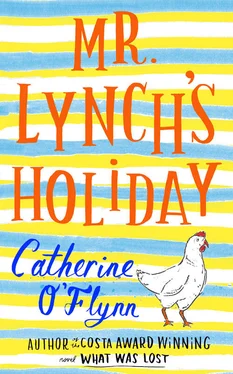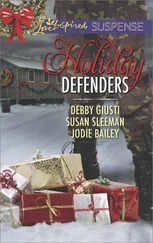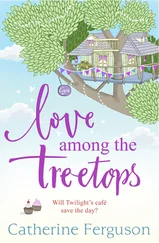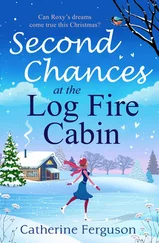‘That’s right,’ said David, ‘it’s not a big deal any more, we do it so often. No need for everyone to gather around the computer and have a big, formal conversation. Now it’s often just a quick “Hi” to Rachel or Jonathan, and then they take the laptop and put it in the room where the kids are.’
Jean laughed. ‘George, he’s the little one, only four, he might trundle over and say, “Hello, Granny and Grandpa,” and tell us what new toy he has, or what he did that day at nursery, and then Olivia will come and chat for a minute or two, but then they just get on with whatever they were doing and we can just sit and watch them as if we’re in the room with them. It’s so lovely, just natural and relaxed, sometimes they completely forget we’re there.’
‘Yes!’ said David. ‘Last week they went out and didn’t even say goodbye, just left us there in the playroom, wondering where they all were.’ He laughed.
Jean shook her head. ‘Well, we’re no better, we sometimes fall asleep in front of the screen. It’s just so soothing, hearing their voices. You know, sometimes, when we’ve felt a bit anxious about things here, we can just open the computer and straight away you feel that sadness lift. If we’ve had difficulty sleeping at night, we’ll find we nod off the next day when we’re there listening to them. It’s odd though, isn’t it, David, waking up an hour or two later and seeing the empty room?’
‘Yes, it can be. If they see we’re asleep, they don’t wake us, they just leave us and go off doing whatever it is they need to do.’
She nodded. ‘You see the empty room and you say, “Is anybody there?” and it’s a bit like a seance. I’m not sure who the ghosts are, them or us.’ She was quiet for a moment. ‘I suppose it must be odd for the kids.’
They sat in silence for a while, Dermot looking at his hands. Eventually Jean turned to him and smiled.
‘And do you like word searches, Dermot?’
The same faces at every funeral. The same but fewer. It reminded Dermot of the game Eamonn and the other kids used to play at birthday parties. When the music stopped — the desperate craning of necks to see who didn’t have a seat, who had been banished from the contest. It was the same thing now. Every few months a phone call and then a funeral, each of them wondering whose turn was next. Some deaths were shocking, others expected, others still felt long overdue. The florid, thickset ones were the first to go — stomachs pushing out their shirts, bacon every morning, beer every night, yellow spots in their eyes, they knew well themselves they would never live to see their kids married. Mick Fitzsimmons went at forty-two, collapsed in the car park of the Cash & Carry, a massive coronary. Others clung on despite all the odds. Nell Gahan, with her pills and her sticks and half her life spent in the doctor’s waiting room, was still scuttling about like a Dannimaced cockroach, whispering prayers at every graveside.
Their promises to keep in touch and plans for future get-togethers ‘in happier circumstances’ never came to anything. There was an acceptance: they saw each other only when someone died. Long, bitter-sweet afternoons, sitting in the orange sunlight of a back lounge or function room. Recalling faded capers and well-worn one-liners. Half-hearted gossip still about long-ago scandals and comeuppances. Confiding small tragedies of estranged siblings and nervous illnesses. Endless ham sandwiches and double measures of Jameson’s. Joe Fahey still failing to get his round in, Jim Scanlon as full of it as ever. At funerals, sitting with old friends, they felt their true selves, but later, in living rooms with televisions on and grandkids racing around the sofa, they would be tired and irritable and wonder why they’d wasted the afternoon with a bunch of relics.
Once Dermot turned sixty-five the funerals started coming as thick and fast as the weddings had done in his twenties. He had attended both wedding and funeral of more friends than he cared to remember. It seemed to him now that a wedding was an IOU, a funeral the debt collected. Hidden amid the high spirits and cheers of the wedding day was the sobering truth buried in the heart of the vows: ‘Until death do us part.’
Standing at the graveside looking at the newly widowed, Dermot would remember the newlywed. Glancing around he’d see others who had crowded into group shots in front of the church doors a lifetime ago. At least two of the old crowd — Paddy Mahoney and Johnny Begley — were still wearing the suits they got married in to the funerals of friends fifty years later.
He did not find the comfort in religion that Kathleen had. He mouthed the liturgy but it struck no chord within him. He found himself empty of any great insights or thoughts. As he attended one requiem mass after another, he felt like a man standing on a beach, paralysed in thought and action as the tidal wave approached.
He had always known that one day it would be Kathleen’s funeral he was attending. Save an accident of some kind, it was never really in doubt that she would go first. He would make himself remember this sometimes when they were short with each other, the atmosphere curdled. But those good intentions were short-lived. Perhaps in the end it wasn’t right to keep someone’s eventual death constantly in mind, to frame each remark in the context of the graveside. Life had to be lived in denial of death, and with the right to be sometimes aggrieved, sometimes ill-tempered, sometimes disappointed.
When Kathleen’s turn came, there were all the usual crowd and more. Some faces Dermot hadn’t seen in over fifty years. Old girlfriends of hers: giggling, teasing mouths and darting eyes last seen in dance halls and crowded bars, now old grannies with thick ankles squeezed into patent-leather shoes.
‘Do you not remember me, Dermot? You asked me out to the cinema and, when I turned you down, you asked Kathleen instead.’
Dermot remembered her well enough. He remembered too that it was she who had made a play for him, not the other way around, even though everyone had known by then that he was going with Kathleen. He recalled a red two-piece she used to wear. Kathleen said it made her look like a pillar box. He couldn’t wait to tell Kathleen what she’d said, knowing how much it would tickle her. The realization that Kathleen wasn’t around to tell came with weary acceptance. This, he knew, was only the first of many such lapses.
He had yet to feel the sustained impact of grief. At the hospital bedside, he had seen her face change at the point of death. A transition at once almost imperceptible and yet unmistakable. In that moment he had felt a pure blast of horror, calling out to the God he did not believe in and causing the nurse to hurriedly return. Since then, though, he had been busy with arrangements and phone calls and visits to the bank and other places. He felt only a strange lightness. He ate as much as he ever had, but feared a sudden gust of wind could blow him away.
He disliked the priest. He knew this was in part to do with Kathleen’s devotion to the Church, but he couldn’t help it. He tried to listen to his words about Kathleen’s life without rancour. The priest banged on about her great faith, the consolation she had found in the Church, her struggle with ill health. He seemed gleeful to Dermot. His lips wet, his face shiny and pink, flushed with victory. It felt as if a long unspoken battle had come to an end and the priest had won. They had claimed her as their prize.
He was still there in the function room afterwards, sipping his pint of shandy. Dermot avoided the priest’s corner of the room. He made his way around everyone else, thanking them for coming, accepting their condolences, listening to stories of Kathleen, some familiar, some new. Some cousin of hers from Cork waxing lyrical about Kathleen’s abilities with a violin as a ten-year-old. Nurses from the General reminiscing about her sense of humour. Cronies from the church on her flower-arranging skills. He nodded and smiled and kept moving, his head jangling with faces and snatches of conversation. He had a powerful longing to be home, in the back room, gas fire on, glass of beer in one hand, cheese sandwich in the other, watching University Challenge . The thought of the programme, the banks of enviably clever and assured young people, always brought Eamonn to mind and Dermot realized he had forgotten all about him in the confusion of the gathering.
Читать дальше












